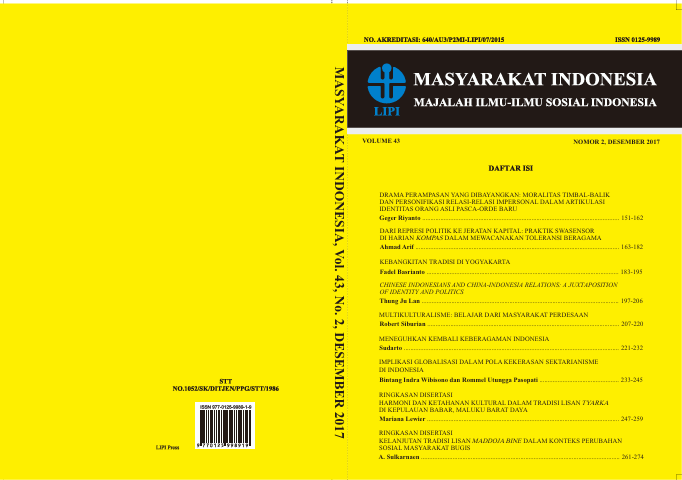CHINESE INDONESIANS AND CHINA-INDONESIA RELATIONS: A JUXTAPOSITION OF IDENTITY AND POLITICS
DOI:
https://doi.org/10.14203/jmi.v43i2.738Keywords:
Chinese Indonesians, China-Indonesia relations, identity, politicsAbstract
In this paper, I would like to discuss various possibilities of Chinese Indonesian positions within the socio-political and cultural framework of Indonesian nationalism and contemporary globalism. As history has shown, the position of Chinese Indonesians is often determined by the interaction between China and Indonesia in the global context, and vice versa. The impact of 1965 tragic event -which is known as the Indonesian Communist Party’s failed coup d'etat- on Chinese Indonesians is the clearest example of such a loose position. Today we face the growing power of China globally which is followed by the strengthened bilateral relations between China and Indonesia in various fields. China’s “new diplomacy†has changed the way its neighbors view Beijing and Chinese diaspora communities which are previously known as “overseas Chineseâ€. As part of a diasporic community, Chinese Indonesians might have to deal with what Nira Yuval Davies calls “multiscalar citizenship of transnational, national and localâ€, signifying a critical juncture between homeland, citizenship and residency.
References
Center for Security Studies, ETH Zurich. (2007), "The Rise of China: Regional and Global Power Shifts", CCS Analyses in Security Policy Vol.2 No.8, February, http://www.css.ethz.ch/content/dam/ethz/special-interest/gess/cis/center-for-securities-studies/pdfs/CSS-Analyses-8.pdf, accessed on February 23, 2016).
Chang, Amy (2013). "Beijing and the Chinese Diaspora in Southeast Asia: To Serve the People", Executive Summary, The National Bureau of Asian Research, NBR Special Report 3 43. http://nbr.org/publications/specialreport/pdf/Preview/SR43_preview.pdf, accessed on February 15, 2016.
Coppel, Charles A. (2008). "Anti-Chinese Violence in Indonesia After Soeharto", In Leo Suryadinata (editor), Ethnic Chinese in Contemporary Indonesia, Singapore: Institute of Southeast Asian Studies, pp. 117-136.
Heilbron, J.L. (2003). "in Diaspora", in Wang, Ling-Chi & Wang Gungwu (eds), 2003, Chinese Diaspora, Selected Essays, Volume 1, Singapore: Eastern University Press, pp. xii-xv.
Lloyd, Grayson J. (2001). "Chinese Indonesians, Unsettled Past, Uncertain Future", in Michael R. Godley & Grayson J. Lloyd (eds), Perspectives on the Chinese Indonesians, Adelaide: Crawford House Publishing, pp. 1-19.
Meskell, Lynn (2002). "The Intersections of Identity and Politics in Archaeology", in Annual Review of Antropology, 2002, 31:279-301, doi:10.1146/annurev.anthro.31.040402.085457.
Mirsha, Rahul & Irfa Puspita Sari. (2010). "Indonesia - China Relations: Challenges and Opportunities", IDSA issue Brief, http://mercury.ethz.ch/serviceengine/Files/ISN/136917/ipublicationdocument_singledocument/ceee86ee-9465-4595-a07e-4d26eb88f18d/en/IB_China-Indonesia.pdf.
Nabbs-Keller, Greta. (2011). "Growing Convergence, Greater Consequence: The Strategic Implications of Closer Indonesia - China Relations", in Security Challenges, Vol. 7, No. 3 (Spring 2011), pp. 23-41, http://www.regionalsecurity.org.au/Resources/Documents/vol7no3Nabbs-Keller.pdf, accessed on 16 February 2016.
Nobuhiro, Aizawa. (2012). "The Inverted Chinese/China Problem in Indonesia: A Preliminary analysis on the 2011 Surabaya Incident", IDE Discussion Paper No. 348, Institute of Developing Economies, JETRO, Japan, http://www.ide.go.jp/English/Publish/Download/Dp/pdf/348.pdf, accessed on March 1, 2016.
Nugroho, Johannes. (2015). "Sinophobia lurks beneath the surface in Indonesia", Today, June 11, 2015, http://www.todayonline.com/chinaindia/china/sinophobia-lurks-beneath-surface-indonesia, accessed on March 8, 2016.
Reaksmey, Hul. (2014). "Cambodia to Receive up to $700M Yearly from China", The Cambodia Daily, November 10, 2014, https://www.cambodiadaily.com/archives/cambodia-to-receive-up-to-700m-yearly-from-china-71925/, accessed on March 8, 2016.
Redaksi Eramuslim. (2016). "Analisa Habib Rizieq Soal Bahaya Cina-Komunis", eramuslim 23 December, https://www.eramuslim.com/berita/analisa/analisa-habib-rizieq-soal-bahaya-cina-komunis.htm#.WHYBZ9J961s, accessed on 11 January 2017.
Reid, Anthony. (2001). "'Outsider' Status and Economic Success", in Michael R. Godley & Grayson J. Lloyd (eds.), Perspectives on the Chinese Indonesians, Adelaide: Crawford House Publishing, pp. 67-82.
Sukma, Rizal, n.d., "Indonesia's Response to the Rise of China: Growing Comfort and Uncertainties", http://www.nids.go.jp/english/publication/joint_research/series4/pdf/4-5.pdf, accessed on February 16, 2016.
Wang, Ling-Chi. (2003). "On Luodi-shenggen", in Wang, Ling-Chi & Wang Gungwu (eds), 2003, Chinese Diaspora, Selected Essays, Volume 1, Singapore: Eastern University Press, pp. ix-xi.
Wang, Ling-Chi & Wang Gungwu ( 2003). "Preface", in Wang, Ling-Chi & Wang Gungwu (eds), 2003, Chinese Diaspora, Selected Essays, Volume 1, Singapore: Eastern University Press, pp.vi-viii.
Winarnita, Monika Swasti. (2014). "'Performing' Chinese-Indonesian belonging: diasporic, transnational, and (trans)local", New Scholar: An International Journal of the Humanities, Creative Arts and Social Sciences Volume 3 Number 1, 2014 | ISSN 1839-5333, www.newscholar.org.au, http://www.academia.edu/6994357/Performing_Chinese-Indonesian_belonging_diasporic_transnational_and_trans_local, accessed on February 28, 2016.
Yuval-Davis, Nira, 2011, "Power, Intersectionality and the Politics of Belonging", FREIA Working Paper Series No. 74, ISSN:0907-2179, http://vbn.aau.dk/files/58024503/FREIA_wp_75.pdf, accessed on 22 July 2016
Zerba, Shaio H., 2008, "The PRC's Overseas Chinese Policy", thesis, Naval Postgraduate School, Monterey, California, http://dtic.mil/dtic/tr/fulltext/u2/a483586.pdf, accessed on February 15, 2016.
Zerba, Shaio H., 2008, “The PRC’s Overseas Chinese Policyâ€, thesis, Naval Postgraduate School, Monterey, California, http://dtic.mil/dtic/tr/fulltext/u2/a483586.pdf, accessed on February 15, 2016.
Downloads
Published
How to Cite
Issue
Section
License
Copyright (c) 2018 Author(s)

This work is licensed under a Creative Commons Attribution-ShareAlike 4.0 International License.


